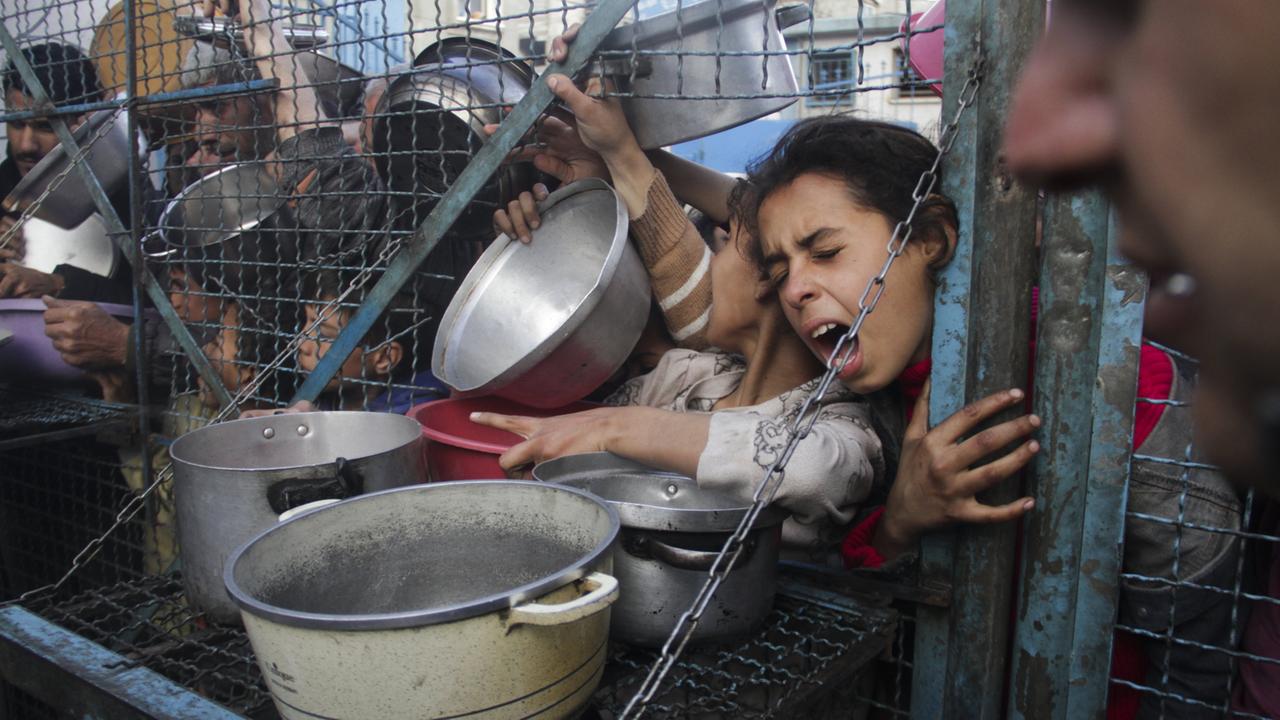The Gaza war has now lasted almost six months – hundreds of thousands of people lack basic necessities. A Palestinian with a German passport explains how his family has been fighting for survival for months.
Saleh Eid hardly knows where to start. The civil engineer graduate arrived in Rafah this week with his wife, two-year-old son and daughter, who was born at the end of February. They have survived six months in his hometown of Jabaliya, just north of Gaza City.
The cell phone connection is unstable. It's lucky that she doesn't stop talking during the conversation. “We saw death with our eyes every day,” Saleh says. They had been through a lot, from the shells, from the air-to-ground missiles and, above all, from hunger. “Me and my wife sometimes didn't eat for two days. Nothing at all.”
They have had to change quarters five times since the war began, says Saleh. He lived in Germany for many years and moved back to Gaza in 2019. Her house was badly damaged when bombs fell nearby. They stayed with a cousin in Jabaliya for two weeks. Then her apartment, which was next to a mosque, was also destroyed. Again we went to another apartment. Then to Gaza City, very close to the Al-Shifa hospital, in a high-rise building where around 1,000 people sought protection. Shortly before their daughter was born, his wife wanted to return to Jabaliya.
Horrible prices for food
Fruit and vegetables that used to be grown in large quantities in the north of the Gaza Strip are no longer available, and have been for five months. The fields in the north have been completely bulldozed.
The few foods that are available on the street are horribly expensive. Saleh gives a few examples: “A kilogram of meat currently costs 75 euros. A kilogram of lentils costs 40 euros. Lentils – only poor people eat them here.” A kilogram of rice costs up to 40 euros. In the past, a 25 kilo bag of rice cost the equivalent of ten euros. No one could pay that anymore. The prices are so high “because no help comes. Everything is stolen at the border, either by the people there or Hamas takes it.” There is no help, no food and no humanitarian food packages.
Anger at Hamas is growing
In their distress, people would make soup out of grass. “The main thing is that there is something to eat.” There are still around half a million people in the north. “And these people are all hungry.”
October 7th was fundamentally wrong. He and his family – they have lived in Jabaliya for a long time – were never part of Hamas. Many Palestinians in Gaza hated Hamas even before October 7th. 75 percent, he estimates. And today? Much more so, “because Hamas took everything away. And there was already a lot of poverty in Gaza before October 7th.”
And now people were asking themselves: “Who will pay the penalty for October 7th? Only the civilian population.” 80 percent of those who died were civilians. “They had nothing to do with the whole story,” says Saleh. “And many of them also hate Hamas.”
Saleh doesn't believe in the Israeli army's reports that Hamas has largely been defeated militarily and that there are only a few Islamist battalions left in Rafah. Because his observation goes like this: Not 20 percent of Hamas were killed. “Hamas is still strong. Their military is everywhere. They control everything.”
Hoping to leave
Last Tuesday, Saleh, who has a German passport and whose four adult children from his first marriage live in Germany, received a call he had been waiting for for a long time. A call from the German representation office in Ramallah, which is responsible for the consular support of Germans in the occupied West Bank and – remotely – in Gaza. He and his family are on the list to leave via Rafah to Egypt and on to Germany. They quickly made their way south. A cousin drove them for 75 euros to near the Israeli army checkpoint that has separated the north from the south of the Gaza Strip since the end of October.
They had to get out two kilometers beforehand because the cousin was too scared. His wife carried the baby and the small bag, he carried the three large bags and the two-year-old in his hand. Then they witnessed how the Israeli soldiers used facial recognition AI to record everyone and sometimes shortly afterwards call out some by their name. This is a large checkpoint, 500 to 600 meters long. The soldiers spoke with a microphone and said: “Run through the street and look into the camera.”
“Made of devils”
They got through, after another two kilometers of walking a relative picked them up, to Deir al Balah, and finally to Rafah. His wife and children were able to cross the border last Wednesday. Saleh hopes it will be his turn on Monday.
Gaza will be destroyed for 100 years, everything – houses, homeland, schools, universities, shops, hospitals. Why did the West remain silent for so long and say nothing? Before we end our conversation, he replies: From the beginning of the war, “the whole of Europe and America made us devils, the devils of Gaza. We are devils.”
Clemens Verenkotte, ARD Tel Aviv, tagesschau, April 6, 2024 8:53 a.m





